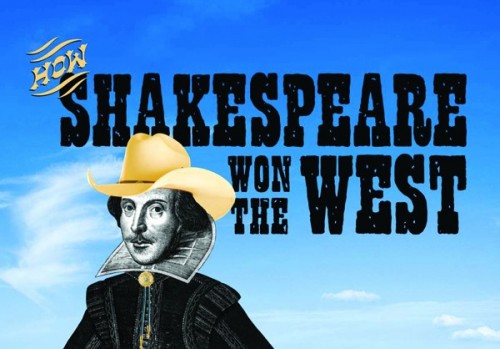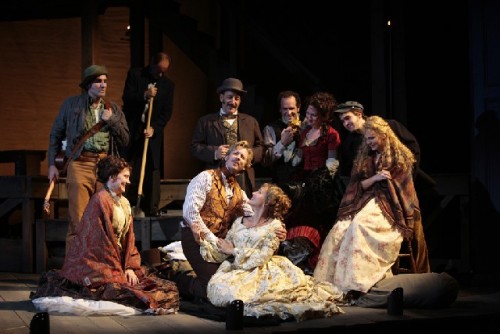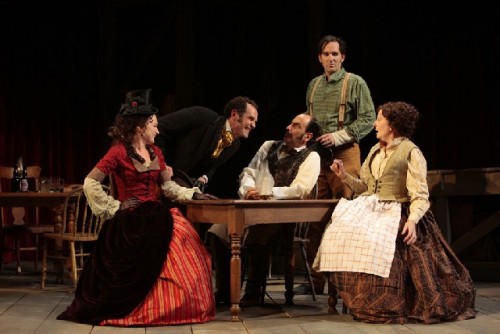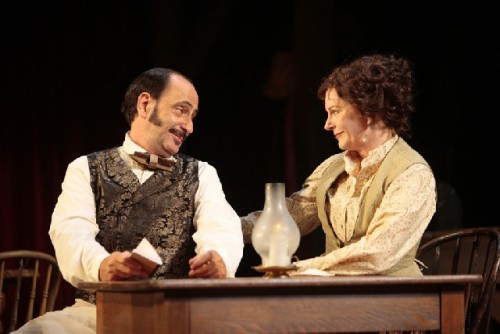How Shakespeare Won the West World Premiere At The Huntington Theatre Company
49ers Entice Ragtag Group to Perform Bard's Words
By: Mark Favermann - Sep 13, 2008
How Shakespeare Won the West
World Premiere
Written by Richard Nelson
Directed by Jonathan Moscone
At The Huntington Theatre Company
Boston University Theatre
264 Huntington Avenue, Boston.
Box Office 617-266-0800
September 5 through October 5, 2008
http://www.huntingtontheatre.org
Brave. That is the term that describes an established theatre company when it stages untried new productions. Brave is the Huntington Theatre Company. The new season of the Huntington opened this past weekend with an enthusiastic and talented ensemble performing a World Premiere of Tony award-winning playwright Richard Nelson's How Shakespeare Won the West.
The story revolves around a ragtag troupe of actors from a New York saloon cum players' guild heading West during the California Gold Rush, seeking fame and perhaps fortune performing Shakespeare for learned appreciating '49ers. But with unexpected competition, romantic entanglements, life cycle issues, and an Indian Chief who identified with King Lear, their ambitious cross-country adventure is severely complicated by the challenges of the American frontier.
Along the way, while waiting to cross the Missouri River, the troupe encounters a tall, young, corny lawyer named Abe from Illinois who loved Shakespeare. In addition, members of the group served as faux preachers, were adopted by gun-toting celibate religious zealots and were helped by a whore who "finds" money and treasure in the street whenever the company needed it.
While attempting to embrace elements of Shakespearean comedy, and American vaudeville, this plays tries to celebrate the human spirit through the metaphor of the classical itinerant acting company. Written by Olivier and Tony Award-winner Richard Nelson (James Joyce's The Dead and Two Shakespearean Actors), it is too bad that the promise is greater than the premise.
New Huntington Artistic Director, Peter DuBois, wanted to start his tenure and the 2008-2009 Season with an exuberant, ambitious production celebrating theatre. He picked a rising star's new play. Dubois took a calculated risk. However, good acting, great set design, great costumes, interesting story premise and even good intentions are basic ingredients that don't necessarily add up to a great or even very good play. Unfortunately, this is the case of this rather too long, somewhat character-confusing, and not very clearly structured show.
As with all theatrical productions at the Huntington Theatre Company, How Shakespeare Won the West was professionally presented. Technically and performance-wise, as usual with the Huntington, it was superb. The written material, the storyline or play with which the many actors had to work is in need of great editing and a more thoughtfully integrated narrative arc. Unlike a rose, narrative is not always narrative but sometimes just plain obfuscation in the form of a semblance of a story. New plays often need editing, refining, revising, rewriting and refocusing. This is the case with Richard Nelson's play.
Even in spite of working with a script that was not tight enough, technically and artistically the show was a success. What is good, even bordering on great, about this How Shakespeare Won the West production is that lesser actors and lesser direction would have made this a pig's breakfast of a play. There were no weak links in the many actors and their roles.
Elliot Norton Award Winner and long time American Repertory Theatre (A.R.T.) company member Will LeBow was a center piece as the traveling company's head, Thomas Jefferson Calhoun. LeBow has been an audience favorite at the Huntington in past performances The Cherry Orchard, The Rivals, Love's Labor Lost and Sonia Flew. Drama Desk nominee Mary Beth Fisher plays his wife Alice Calhoun. She has most recently been in the Steppenwolf Theatre's production of Dead Man's Cell Phone.
Elliot Norton Award Winner Jeremiah Kissel played utility player Edward Oldfield who masquerades as a British actor despite being from Albany, New York. Others in the cast included Ron Campbell, a Los Angeles as well as San Francisco Critics Drama Circle Award winner, John DeVries, Chris Henry Coffey, Kelly Hutchinson, Erik Lochtefeld, Sarah Neilis, Susannah Schulman, Joe Tapper, Nathan Combs and Curt Klump. Considering what they had to wok with, all of the acting ensemble performed quite well.
Technically, as usual the Huntington is always on the highest level. Direction by Jonathan Moscone was subtle and even deft. He is the California Shakespeare Theatre (CalShakes) Artistic Director. His body of work has been lauded by the San Francisco Chronicle. Set design by Antje Ellermann was interesting, flexible and evocative. The costumes were exactly right and sometimes quite beautiful by Laurie Chuba Kohn. Lighting design was atmospheric by Japhy Weidman as were the music composition and sound creation by Rob Milburn and Michael Bodeen.
With such strong actors and support staff exhibiting such technical facility, it is a shame that How Shakespeare Won the West is not better. Richard Nelson has tried to say too much while obscuring what is best about this narrative-the history, texture and personalities of America's westward migration. This play starts off very slowly and confusingly while setting up the story. Too long, there should have been an intermission after a dramatic death along the trail. The production ends in a sort of a Renaissance revival climax with all the dead resurrected and everyone dancing. Shakespearean or just a shtick ending device?
There is definitely a good idea here that needs to be simplified and focused. Clearly, Mr. Nelson has some work to do. Perhaps, all manifest destinies start off their journey on a shaky footing?





